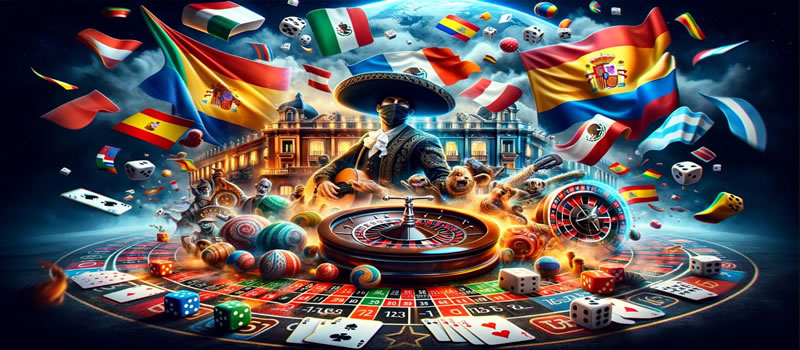The allure of the jackpot is incredibly powerful that individuals across different backgrounds are drawn to it. It presents a nearly irresistible pull is the possibility of winning a large sum of money through casino games, participating in lotteries, or other games of chance. For millions of people around the world, the idea of becoming wealthy and financially independent overnight holds great appeal. Several mental triggers play a role in the jackpot's allure.

Key Takeaways
- Why jackpots captivate us: The excitement of landing a huge win draws people in due to the potential for transformative gains.The dopamine-driven jackpot effect: The brain's response to potential rewards, such as winning a jackpot, is driven by the release of dopamine, creating a feeling of pleasure and drive.Risk and reward dynamics: The attraction to jackpots stems from the combination of risk with the possibility of reward, engaging the brain’s reward circuits.The psychology of hope and optimism: The chance of a big win impacts our mindset, fostering a sense of hope and optimism for the future.Social and cultural influences: The jackpot’s appeal to us is influenced by societal values, cultural expectations, and social influences.
The ability to enjoy luxury without worrying about money and the possibility of financial liberation is highly appealing to many. The allure of potentially affording anything, such as luxurious clothing or exotic trips, motivates people to strive for big successes. In addition, a major part of the jackpot's appeal comes from its unexpected nature & unpredictability. The rush can’t easily be replicated the excitement that is produced by the prospect of striking it lucky with a single lottery ticket purchase or by spinning the wheel for a large payout. The allure of the jackpot also appeals to people's primal need for risk-taking and excitement.
The chance of getting rich offers an exciting new life beyond the monotony of daily life. Many people are motivated to chase after huge jackpots because they feel a deep connection in the concept of taking a risk & possibly emerging victorious. The thrill of placing a huge bet or the suspense of waiting for the lottery results are just two examples of how people are drawn to jackpots because they represent human nature's need for excitement and risk. Dopamine's Role in Anticipating Wins. Dopamine plays a major role in attracting us to potential rewards, which is why jackpots are so alluring.
A neurotransmitter called dopamine is produced in response to pleasurable experiences like eating delicious food, taking part in enjoyable activities, and yes, winning big. Dopamine plays a crucial role in the brain's reward circuits. Dopamine is triggered in our brain when we expect a possible reward, such as a lottery win, which feels great and makes us want to go after the reward even more. The Dopamine-Propelled Chase of Massive Victories. There’s a powerful drive to seek out big wins by the strong attraction that is created when dopamine is released in response to possible rewards.
The possibility of winning a massive prize causes the brain to release a large amount of dopamine, which produces an irresistible rush and excitement. It is this dopamine-driven reaction to possible rewards that fuels our craving to take chances in the hopes of landing a big win & pulls us towards jackpots. Addiction and compulsive behavior: dopamine’s downside. The brain releases dopamine in a cascade when we anticipate a big win, which can cause addiction-like excitement of hope and excitement. Some people develop an addiction to gambling, which can be explained by dopamine's role in our draw to jackpots. A powerful psychological force that can result in compulsive behavior & a loss of self-control is driven by the dopamine released for big win potential.
Our natural desire for risk and reward is closely tied to the allure of the lottery. The possibility of striking it rich is a risky proposition that appeals to our innate yearning for thrills and experiences. Our interest in jackpots is fueled by the risk and excitement that comes with going after big victories. Lots of people are motivated by the concept of risk-taking and possibly hitting it big, which pushes them to take chances in the hopes of winning the ultimate lottery prize. Our evolutionary past as hunter-gatherers may also be used to explain the role that risk and reward play in attracting us to jackpots.
Taking chances has been crucial to human survival throughout history because it often determined gathering food and going without. Because our ancestors found this behavior beneficial in securing resources, it is ingrained in our brains to look for opportunities with high rewards. This natural inclination for risk still shapes our actions today, causing us to be drawn to jackpots and urging us to take more risks in the hopes of striking it rich.
Risk and reward drive our pull to jackpots, which relates to our craving for freedom and autonomy. The potential for wealth offers the chance to live life without limits and on one's own terms. The opportunity to take a risk and perhaps landing huge rewards appeals to our desire for control and self-determination, which motivates us to go for big wins in the quest for financial independence. Our attraction to jackpots is largely driven by the optimism and hope that big wins inspire. The chance for a massive win provides a ray of hope for a brighter future, which bolsters our confidence and drives us to go after big wins.
It is hard to ignore the optimism that arises from the idea that one lucky moment has the potential to transform our lives. The potential for great wealth taps into our innate yearning for optimism & hope, pushing us to take risks in the quest for financial security and financial stability. The psychology of optimism and hope also deeply influences our mindset about going after big victories.
We are energized by hope and we are inspired to keep chasing after large wins despite the odds when we have the possibility of winning the jackpot. This feeling of anticipation can be highly addictive. We take risks in search of financial security because we have an unshakeable sense of hope that one lucky win could change our future. The role optimism plays in our mindset when it comes to going for big wins also connects to our deep desire for control of our own lives. Hope powers us forward by the possibility of striking it rich, which drives us to gamble in the search for financial freedom and freedom from financial constraints. It is impossible to overestimate the power of social and cultural pressures on our attraction to jackpots.
We are continuously exposed to messages that reaffirm the appeal of striking it rich, from the popular media's portrayals of sudden wealth to social pressures to achieve financial wealth. Our view of jackpots are shaped by cultural and social messages, which also feed our addiction to jackpots and encourage us to gamble in the pursuit of money. Social pressure and cultural expectations are just two more examples of how cultural pressures shape our attraction to jackpots. Seeking large victories is seen as an desirable, glitzy, and exciting pursuit in various social groups.
Individuals might gamble more in an effort to gain validation or impress others by feeling pressured to match the success of peers or coworkers who have made money through gambling. Our innate need for status is further evidenced by the societal influences on our draw to jackpots. The reason we crave jackpots and pushes us to gamble in the hopes of winning big is the chance for wealth and fame, which can further improve one's social status. The Addictive Nature of Jackpot Pursuits. Dopamine's influence on big wins can create a dangerous cycle that causes individuals to keep gambling in the hopes of hitting it big, often at a huge cost.

In addition, gambling for jackpots can damage personal relationships, leading to isolation & isolated. The necessity of Support & Awareness. The dangers of chasing jackpots highlight that people who may be experiencing compulsive gambling behavior need compassion and assistance.
It is imperative that society understands the possible risks associated with chasing jackpots and provide help to individuals who may be at risk of developing addictive behaviors. By taking these steps, we can endeavor to establish a setting that is safer and more encouraging for people who might be having trouble the temptation of jackpots. Create healthy gambling habits to allow people to control the emotional impact of jackpot chasing.
Limiting the time spent and money spent on gambling can help people stay away from compulsive behavior patterns and reduce the risks in chasing large wins. For individuals struggling with gambling addictions due to jackpot chasing, getting help from friends, family, or trained professionals can be a great resource. Individuals can protect themselves from developing compulsive gambling behavior patterns by adopting healthier coping strategies for handling stress and anxiety.
Individuals can find alternatives to manage their stress without turning to high-risk gambling activities by staying active, meditating, or finding enjoyable hobbies and pastimes. To sum up, individuals of all backgrounds are drawn to the jackpot because of its irresistible attraction. The appeal of large wins is driven by numerous mental triggers, ranging from the dopamine response in reaction to potential gains to our innate desire for risk and reward. However, to avoid falling into gambling addiction, people should be aware of the possible risks involved in jackpot pursuits and adopt healthy habits for managing the emotional effects.
Individuals can still enjoy the thrill of jackpots without giving in to the negative effects of compulsive gambling behavior by understanding the mental triggers behind jackpot attraction & cultivating responsible, responsible gambling behaviors.
FAQs
What is the psychology behind the attraction to winning big jackpots?
Our interest in large jackpots stems from the brain's reward system. When we anticipate the possibility of winning a large sum of money, our brains release dopamine, a neurotransmitter associated with pleasure and reward. This dopamine release creates a feeling of excitement and creates hope, which can be highly addictive.
Why do people continue to play for jackpots even after experiencing losses?
Gamblers keep playing despite losses due to the phenomenon known as "near-miss" experiences. When individuals come close to winning but ultimately fall short, it creates a dopamine boost similar to that of a real win. This near-miss experience fuels hope and encourage continued play, even when they’ve lost before.
What role does social influence play in the attraction to winning big jackpots?
Social influence plays a significant role in our craving for jackpots. The visibility of jackpot winners in the media and among friends can create a sense of social proof, leading individuals to think winning is possible and desirable. On top of that, the joy and celebration around big wins can motivate others to start gambling.
Are there any potential negative effects of the attraction to winning big jackpots?
Craving big wins can have negative consequences, particularly when it becomes compulsive or addictive. Excessive gambling in pursuit of jackpots can cause financial problems, relationship problems, and mental health issues. Moreover, the allure of winning big jackpots can create false hope and skew one's view of odds.
What are healthy ways to handle jackpot attraction?
Individuals can manage their attraction to winning big jackpots with smart strategies by limiting time and money spent on gambling, gambling responsibly, and asking for help if they suspect their interest is turning into an issue. It's important to approach gambling activities with a balanced popular live casinos perspective and to prioritize enjoyment and entertainment over the pursuit of large wins.